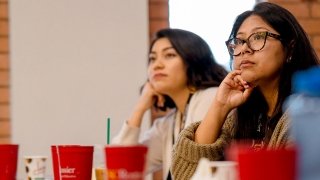Courses

Course Schedule
The full-time course schedule below should be used as an example. A part-time option is also available. Contact your admission representative to discuss your specific course schedule.
Year 1
Summer Session
The Counseling Process
Become familiar with theoretical foundations, models, values and assumptions underlying psychological counseling; cross-cultural perspectives, experiential learning opportunities and recovery-oriented care.
Professional Identity, Law and Ethics for Counselors
Explore the history of the field of counseling and professional identity development. Examine current legal, ethical and other professional issues in counseling.
Interrogating Systems of Inequity in Professional Practice
Establish a conceptual framework for a critical social justice perspective within the mental health field. Grapple with how to be an agent of social change as a clinician and global citizen.
Fall Semester
Theories in Counseling
Become knowledgeable about multiple theories of counseling and familiarize yourself with client conceptualizations and treatment strategies. Begin to formulate your unique theoretical orientation.
Psychopathology for Marriage and Family Therapists
Become familiar with theories of psychological impairment with an emphasis on the diagnosis of child and family dysfunction. Practice utilizing DSM-5 classification of case studies.
Research Methods and Data Analysis for Counselors
Learn about various research designs and their appropriateness for addressing different research questions. Identify threats to validity and other challenges in research as well as basic statistical methods and their use. Recommended preparation: beginning statistics course.
Counseling through the Lifespan
Explore developmental stages and life events from infancy to elder years and their effect upon individuals, couples and family relationships within a cultural context.
Spring Semester
Theories of Marriage and Family Therapy
Gain an introduction to major family systems theories and their unique assumptions, goals and techniques. Learn how to assess relationship dynamics and conceptualize cases with sociocultural attunement.
Psychological Assessment
Explore educational and psychological instruments; psychometric concepts and the rationale for the use of psychological instruments in the counseling relationship. Understand implication of risk, suicide assessment and the clinical interview process.
Psychopharmacology and the Effects of Substance Abuse
Examine the biological basis of behavior and become introduced to psychopharmacology (particularly for students without a science background). Explore the psychoactive agents used in the treatment of mental illness and an examine the etiology and treatment of substance abuse and co-occurring disorders.
Psychotherapy with Children and Adolescents
Explore the psychological, social and cultural dimensions of childhood, with a focus on direct practice with children and their families in urban settings. Evidence-based interventions for this population are demonstrated and practiced.
Year 2
Summer Session
Child and Elder Abuse and Domestic Violence
Review laws governing the mandated reporting of child and elder abuse, the procedures involved, as well as etiology, effects and treatment interventions.
Group Counseling: Theory and Process
Explore theory, research and practice of group counseling. Includes laboratory experience.
Practicum in Counseling
Conduct supervised clinical work with adults, couples, children and families.
Fall Semester
Perspectives on Human Sexuality
Learn about the physiological-psychological and socio-cultural variables associated with sexual identity and sexual behavior with an emphasis on increasing mastery in addressing sexual topics within a brief therapy context.
Multicultural Counseling: Research and Practice
Become a more culturally responsive mental health professional and develop sensitivity to the dynamics of power and powerlessness across various social identities as well as the intersectionality among these dimensions that profoundly affect the therapeutic relationship.
Practicum II
Conduct supervised field experience in a clinical setting that focuses on the development of novice therapists in a small group setting.
Spring Semester
Career Development: Theory and Process
Help clients by enabling them to increase their access to educational and career opportunities. A number of theories are examined to promote your ability to critically evaluate their efficacy for diverse populations.
Counseling Couples in Relationships
Examine development and change with couples and other relational configurations, utilizing roleplays and examining intervention effectiveness.
Marriage and Family Therapy Capstone: Leadership Project
As the culminating academic, professional and reflective experience in the final year, engage in a research project to identify a gap in clinical practice and ascertain your role as change agent in addressing clinical problems with approaches that are socially just and attuned to power and privilege in the field of Marriage and Family Therapy and the global community.
Practicum II
Conduct supervised field experience in a clinical setting that includes case presentations and development of critical thinking and holistic conceptualizations.
